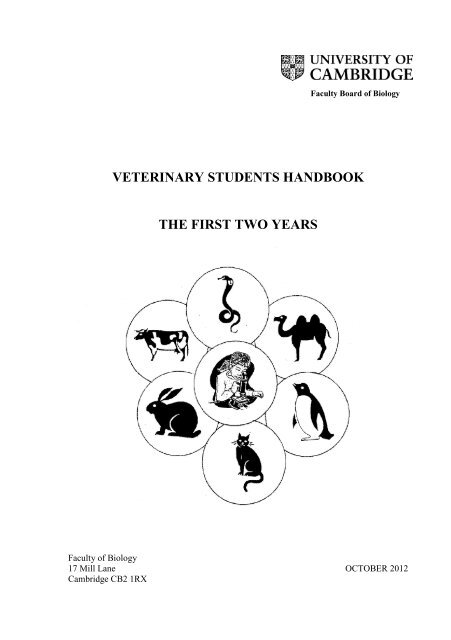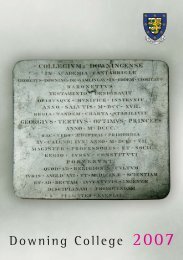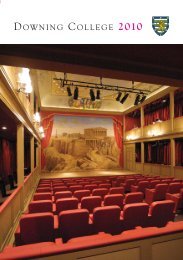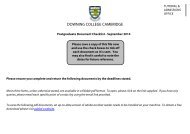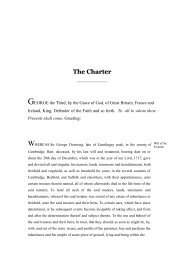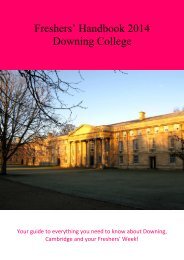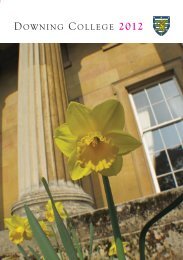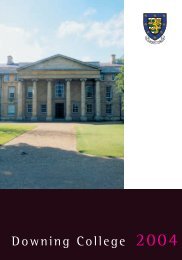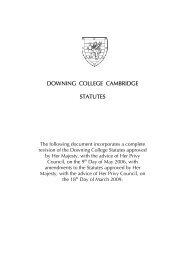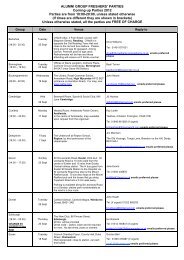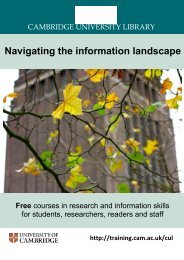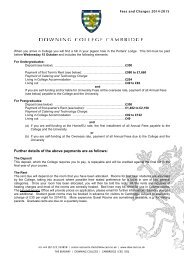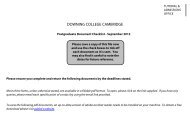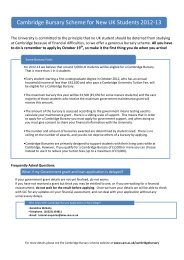veterinary students handbook the first two years - Downing College
veterinary students handbook the first two years - Downing College
veterinary students handbook the first two years - Downing College
You also want an ePaper? Increase the reach of your titles
YUMPU automatically turns print PDFs into web optimized ePapers that Google loves.
Faculty Board of Biology<br />
VETERINARY STUDENTS HANDBOOK<br />
THE FIRST TWO YEARS<br />
Faculty of Biology<br />
17 Mill Lane<br />
Cambridge CB2 1RX<br />
OCTOBER 2012
UNIVERSITY OF CAMBRIDGE<br />
VETERINARY STUDENTS HANDBOOK – MVST PARTS 1A & 1B<br />
Contents<br />
Page<br />
Veterinary Education in Cambridge 1<br />
The Aims of your First Two Years 2<br />
Section A. Your duties as a <strong>veterinary</strong> student<br />
The Veterinary Student Code of Conduct 3<br />
Student Support and Guidance 6<br />
Monitoring and Mentoring Student Progress 7<br />
Confidential Sources of Advice 8<br />
Section B. Course and Assessment Information<br />
Outline of <strong>the</strong> Vet Course 9<br />
<strong>College</strong>s and <strong>the</strong> University 10<br />
Assessment and Exams 11<br />
Complaints 12<br />
Attendance at Teaching Sessions 12<br />
First Year Courses 13<br />
Preparing for <strong>the</strong> Veterinary Profession 13<br />
Principles of Animal Management 14<br />
Second Year Courses 14<br />
The Third Year 14<br />
The Clinical Veterinary Curriculum 15<br />
Programme Outcomes 15<br />
Lecture free final year 16<br />
Student feedback and representation 17<br />
Estimated additional course costs 2012-13 18<br />
Course Organisers 19<br />
Section C. Veterinary Students’ Register<br />
Veterinary Student Register Agreement 23
Veterinary Medicine at Cambridge: The <strong>first</strong> <strong>two</strong> <strong>years</strong><br />
Welcome to Cambridge, and congratulations on gaining a place to study <strong>veterinary</strong> medicine. This is<br />
<strong>the</strong> beginning of an exciting and challenging time: going to University, perhaps leaving home for <strong>the</strong><br />
<strong>first</strong> time and embarking on a demanding course which will lead you to qualification in a highly<br />
respected profession. This <strong>handbook</strong> provides a general introduction to <strong>the</strong> Cambridge <strong>veterinary</strong><br />
course for <strong>students</strong> starting <strong>the</strong>ir course in October 2012, and covers mainly <strong>the</strong> <strong>first</strong> <strong>two</strong> <strong>years</strong>.<br />
Dr David Good<br />
Director of Education, Faculty of Biology<br />
1
The Aims of <strong>the</strong> First Two Years of your Veterinary Education<br />
It is sometimes difficult for <strong>veterinary</strong> <strong>students</strong> in <strong>the</strong> early <strong>years</strong> to see <strong>the</strong> relevance of <strong>the</strong> things<br />
<strong>the</strong>y are learning to <strong>the</strong>ir future careers as <strong>veterinary</strong> surgeons. With hindsight many wish <strong>the</strong>y had<br />
paid more attention to biochemistry as <strong>the</strong>y struggle to understand <strong>the</strong> metabolic diseases of cattle<br />
and sheep. Perhaps <strong>the</strong>y did need to understand <strong>the</strong> physiology of <strong>the</strong> kidney as <strong>the</strong>y sit up all night in<br />
<strong>the</strong> intensive care unit with a dog in renal failure. Maybe knowledge of neurophysiology and anatomy<br />
would help explain <strong>the</strong> uncontrolled twitching in <strong>the</strong> hind leg of a thoroughbred horse.<br />
It is important for <strong>students</strong> beginning <strong>the</strong> <strong>veterinary</strong> course in year one to know that <strong>the</strong> clinical<br />
course at Cambridge builds on <strong>the</strong> pre-clinical, relying heavily on knowledge, understanding,<br />
problem solving and o<strong>the</strong>r skills developed in <strong>the</strong> <strong>first</strong> three <strong>years</strong>.<br />
By <strong>the</strong> end of <strong>the</strong> <strong>first</strong> <strong>two</strong> <strong>years</strong> we aim to give you a sound grounding in <strong>the</strong> sciences needed for<br />
<strong>veterinary</strong> practice and <strong>the</strong> basic knowledge and <strong>the</strong> skills to prepare you for <strong>the</strong> clinical part of <strong>the</strong><br />
course.<br />
You will also learn technical skills, but <strong>the</strong>re are o<strong>the</strong>r skills - notably listening and talking to people,<br />
and being able to handle animals in a careful and safe manner - which are essential for a veterinarian.<br />
We expect you to practise and develop <strong>the</strong>se skills, and one of <strong>the</strong> best ways to develop your<br />
communications skills is in <strong>the</strong> supervisions arranged by your <strong>College</strong>. Do participate in supervisions<br />
- <strong>the</strong>y are not just teaching sessions, <strong>the</strong>y are learning sessions, and learning requires self-expression.<br />
Also, ask questions in practical classes; <strong>the</strong> demonstrators are <strong>the</strong>re to help.<br />
Although most of <strong>the</strong> teaching that you receive during <strong>years</strong> one to three is under <strong>the</strong> supervision of<br />
<strong>the</strong> Faculty Board of Biology, it is <strong>the</strong> Faculty Board of Veterinary Medicine, working through <strong>the</strong><br />
Director of Education in <strong>the</strong> School of <strong>the</strong> Biological Sciences (Dr David Good) and <strong>the</strong> Director of<br />
Veterinary Teaching at <strong>the</strong> Veterinary School (Mr Andrew Jefferies), that is formally responsible for<br />
overseeing <strong>the</strong> professional aspects of <strong>the</strong> <strong>veterinary</strong> course.<br />
2
Veterinary Student Code of Conduct (Preclinical)<br />
Fitness for Practice, Health and Conduct: Guidance for Veterinary Students<br />
As members of <strong>the</strong> University, <strong>veterinary</strong> <strong>students</strong> are subject to <strong>the</strong> statutory provisions of<br />
University Discipline as set out in <strong>the</strong> Statutes and Ordinances. In addition, <strong>the</strong> Royal <strong>College</strong> of<br />
Veterinary Surgeons and <strong>the</strong> University expect all <strong>veterinary</strong> <strong>students</strong> to behave in a manner<br />
appropriate to <strong>the</strong>ir future role as veterinarians.<br />
The University has agreed a Code of Conduct for <strong>veterinary</strong> <strong>students</strong> to guide you during your<br />
studies. The code of conduct expected of you with guidance notes is printed on <strong>the</strong> next page.<br />
Veterinary <strong>students</strong> are also required to confirm <strong>the</strong>ir acceptance of <strong>the</strong> University's Veterinary<br />
Student Code of Conduct and of <strong>the</strong> rules to be observed by <strong>veterinary</strong> <strong>students</strong> by signing <strong>the</strong><br />
Veterinary Student Register form. This imposes important obligations on you, and requires that your<br />
name must be on <strong>the</strong> University's Veterinary Students' Register. A copy of <strong>the</strong> Register form is<br />
included in this <strong>handbook</strong>, but at <strong>the</strong> start of <strong>the</strong> course you will be issued with a copy to sign and<br />
hand in. The copy remaining in this booklet serves as a reminder of what you have undertaken.<br />
It is important that you are aware that <strong>students</strong> whose health or conduct may lead <strong>the</strong>m to be a risk to<br />
patients, clients or Extra-Mural Studies placement providers may be removed temporarily, or<br />
permanently, from <strong>the</strong> Veterinary Student Register and may not be permitted to enter <strong>the</strong> Final Vet<br />
MB examinations for <strong>the</strong> award of <strong>the</strong> Vet MB and registration with <strong>the</strong> RCVS.<br />
3
Veterinary Student Code of Conduct and Guidance<br />
Respect o<strong>the</strong>rs: clients, professionals, teachers and fellow <strong>students</strong><br />
Treat o<strong>the</strong>rs politely and considerately, respect <strong>the</strong>ir views and <strong>the</strong> animals under your care.<br />
Guidance note<br />
In all your dealings with, or in relation to clients, teachers and colleagues, act without any<br />
discrimination, whe<strong>the</strong>r on grounds of age, colour, disability, gender, illness, marital status,<br />
national or ethnic origins, nationality, perceived economic worth, race, sexual orientation, social<br />
status, religious or philosophical belief.<br />
Be an effective and considerate communicator<br />
Always make clear that you are a student and not a qualified vet; be aware of your limitations<br />
and do not exceed your ability when giving information to clients.<br />
Understand accept and agree to be bound by <strong>the</strong> principle of confidentiality of patient data and<br />
also of information concerning staff and <strong>students</strong>.<br />
Ensure that you can be easily contacted by University and Hospital Staff and always reply<br />
promptly to all communications.<br />
Do not use mobile electronic devices to record and store patient information.<br />
Guidance note<br />
Contribute to <strong>the</strong> review of teaching by completing feedback forms as requested by course<br />
organisers and by reporting difficulties as <strong>the</strong>y arise through <strong>the</strong> appropriate channels.<br />
Do not discuss clients or <strong>the</strong>ir animals with o<strong>the</strong>r <strong>students</strong> or professionals outside <strong>the</strong> clinical<br />
setting, except anonymously. When recording data or discussing cases outside <strong>the</strong> clinical setting,<br />
ensure that clients and patients cannot be identified by o<strong>the</strong>rs.<br />
Do not use mobile electronic devices – cameras, mobiles, discs, data-sticks etc. to record or store<br />
patient images or o<strong>the</strong>r information. Never use E-mail, social ne<strong>two</strong>rking sites, ‘Blogs’,<br />
‘Twitter’, ‘Facebook’ etc to share information about clients or patients.<br />
Abide by rules and policies, follow procedures and guidelines<br />
You must be aware of and comply with <strong>the</strong> rules, policies (including health and safety),<br />
procedures and guidelines of <strong>the</strong> University, <strong>College</strong>s, Queen’s Veterinary School Hospital and<br />
Extra Mural Studies placements.<br />
Guidance note<br />
Comply with rules and procedures laid down by <strong>the</strong> Director of Education in Biological Sciences,<br />
Director of Teaching in <strong>the</strong> Department of Veterinary Medicine, General Practitioner in extra<br />
mural studies, Head Nurse or <strong>the</strong>ir deputies. Be in attendance for <strong>the</strong> hours as directed by <strong>the</strong>m<br />
and as required to gain experience of emergency situations. As <strong>veterinary</strong> surgeons you will have<br />
to make decisions not to go to places at <strong>the</strong> times you would like because of your clinical duties.<br />
You have a responsibility to yourself, your financial sponsors and your future patients to<br />
complete your rotations and EMS placements.<br />
Comply with appropriate current and any new health-testing requirements. Be aware of potential<br />
zoonotic infections and comply with control procedures.<br />
Be open and honest<br />
Do not break <strong>the</strong> law. Never threaten violence, act violently towards o<strong>the</strong>rs or act dishonestly.<br />
Guidance note<br />
Just one criminal conviction could jeopardise your career prospects in <strong>veterinary</strong> medicine. Do<br />
not cheat in examinations: cheating, at any level, destroys trust and those who cheat may also lie<br />
and be unfit for <strong>veterinary</strong> practice.<br />
4
Inform <strong>the</strong> Director of Teaching in <strong>the</strong> Department of Veterinary Medicine immediately if you<br />
are involved in any University or police investigation which may lead to charges being brought;<br />
concealment of involvement in a drunken brawl that may lead to prosecution may be viewed as<br />
an even greater offence than <strong>the</strong> incident itself.<br />
Take care of your appearance<br />
Your appearance, personal hygiene and demeanour should always be modest and reasonably<br />
conventional.<br />
Guidance note<br />
The appearance of a <strong>veterinary</strong> student or <strong>veterinary</strong> practitioner should not be such as to<br />
potentially affect a client’s trust in that person’s <strong>veterinary</strong> judgement or standing.<br />
Always wear an identification badge and show your face so that you can be recognised by clients,<br />
teachers and staff. Headdress routinely worn for religious observance must not cover <strong>the</strong> face:<br />
facial expression is an important part of communication and showing your face also makes it<br />
easier for clients with a hearing impairment to hear you and/or lip-read.<br />
When examining patients in any clinical setting, observe <strong>the</strong> appropriate clinical dress code as<br />
laid down for <strong>the</strong> establishment or placement in which you are working.<br />
Take action at an early stage when any problem arises<br />
Inform <strong>the</strong> Director of Teaching at <strong>the</strong> Department of Veterinary Medicine or a <strong>College</strong> Tutor<br />
immediately if you become aware of any problem (personally or in o<strong>the</strong>rs) that may put <strong>the</strong> health<br />
or well-being of clients or <strong>the</strong>ir animals at risk.<br />
Guidance note<br />
Veterinary Medicine is a demanding profession and, at times, all <strong>veterinary</strong> <strong>students</strong> are subject to<br />
stress and anxiety; emotional problems and psychiatric conditions such as depression and eating<br />
disorders are not uncommon; do not hesitate in seeking support (see Confidential Sources of Help<br />
& Advice) as <strong>the</strong> earlier a problem is addressed, <strong>the</strong> greater <strong>the</strong> likelihood of a successful<br />
outcome.<br />
Seek advice if you think a <strong>veterinary</strong> surgeon or colleague has behaved in a way that suggests that<br />
he or she is not fit for practice. Examples of such behaviour include:<br />
• making serious or repeated mistakes in diagnosing or treating a patient’s condition<br />
• not examining patients properly or responding to reasonable requests by owners for treatment<br />
for <strong>the</strong>ir animals<br />
• misusing information about patients<br />
• treating patients without properly obtaining <strong>the</strong> owner’s consent<br />
• behaving dishonestly in financial matters, or in dealing with clients, patients, or research<br />
• making improper advances towards clients<br />
• misusing alcohol or drugs<br />
Do not abuse drugs and alcohol<br />
Guidance note<br />
Abuse of alcohol and o<strong>the</strong>r mind-altering substances may lead to behaviour that puts clients or<br />
patients at risk; problems associated with such abuse e.g. violent and aggressive behaviour<br />
jeopardise your career. Never obtain or seek to obtain drugs that have not been properly<br />
prescribed, prescription or non-prescription, for yourself or o<strong>the</strong>rs by any means.<br />
5
Student Support and Guidance<br />
As a <strong>veterinary</strong> student and future professional you must now be prepared to take responsibility for<br />
your own actions and your own personal development. This means thinking about what you do and in<br />
particular, facing up to and dealing with problems in <strong>the</strong> context of your work and relationships with<br />
o<strong>the</strong>rs. However, <strong>the</strong> University has many support systems in place. For a compendium of essential<br />
information for any student in <strong>the</strong> University see <strong>the</strong> on-line student <strong>handbook</strong>:<br />
http://www.cam.ac.uk/staff<strong>students</strong>/student<strong>handbook</strong>/<br />
Motivational problems: are you on <strong>the</strong> right course?<br />
If you are having serious doubts, talk about <strong>the</strong>m immediately with your Tutor and/or Director of<br />
Studies. There are people who suddenly realise, having got to this stage, that it was all a big mistake.<br />
If you really do want to get out, <strong>the</strong>n don't hesitate to say so; it is never too late to change your mind,<br />
but it can become increasingly awkward. Cambridge offers exit routes from <strong>veterinary</strong> medicine into<br />
o<strong>the</strong>r courses, so you will still acquire a degree.<br />
Are you having difficulty coping with <strong>the</strong> demands of <strong>the</strong> course?<br />
Again, talk to your supervisor and/or your Director of Studies. If you have a serious problem <strong>the</strong>y<br />
will help, or in some cases direct you to sources of professional help, but <strong>the</strong>y should be your <strong>first</strong><br />
port of call.<br />
Are you having Academic problems?<br />
Begin by asking your <strong>College</strong> Supervisor in <strong>the</strong> appropriate subject, but University teachers can be<br />
approached if a problem remains unsolved and, in practical classes, demonstrators are on hand to deal<br />
with immediate queries. Problems with <strong>the</strong>se lectures and practical sessions can be raised with those<br />
who are lecturing or running a particular class.<br />
Complaints or concerns about o<strong>the</strong>r <strong>students</strong> or staff<br />
The Student Code of Conduct requires <strong>students</strong> to ‘take action at an early stage when any problem<br />
arises’. All <strong>veterinary</strong> <strong>students</strong> should seek advice if <strong>the</strong>y think ano<strong>the</strong>r student has behaved in a way<br />
that suggests he or she is not fit for practice. Examples of such behaviour include:<br />
• misusing information about clients<br />
• treating animals without properly obtaining consent<br />
• behaving dishonestly in financial matters, or in dealings with clients, or research<br />
• making sexual advances towards clients<br />
• misusing alcohol or drugs<br />
Complaints and concerns about your fellow <strong>students</strong> should again be raised in <strong>the</strong> <strong>first</strong> instance with<br />
your <strong>College</strong> Tutor or Director of Studies. Complaints about academic staff should be raised with <strong>the</strong><br />
relevant course organiser or with <strong>the</strong> Director of Veterinary Teaching. The University has a formal<br />
student complaints procedure which can be found on <strong>the</strong> web at:<br />
http://www.cam.ac.uk/cambuniv/student<strong>handbook</strong>/complaints/procedure<br />
6
Monitoring and mentoring student progress<br />
The Royal <strong>College</strong> of Veterinary Surgeons has certain expectations regarding <strong>the</strong> attitudes, behaviour<br />
and performance expected of <strong>veterinary</strong> <strong>students</strong> from <strong>the</strong> beginning of <strong>the</strong>ir course through to<br />
graduation and provisional registration and places <strong>the</strong> responsibility for monitoring this on <strong>the</strong><br />
University.<br />
In <strong>the</strong> University of Cambridge, much of <strong>the</strong> day-to-day responsibility for this rests with <strong>the</strong> <strong>College</strong><br />
tutorial and pastoral care system.<br />
The Medical and Veterinary Student Progress Panel<br />
The <strong>College</strong> tutorial and pastoral system is backed up by <strong>the</strong> Medical and Veterinary Student<br />
Progress Panel, which maintains a general overview of <strong>veterinary</strong> student progression throughout<br />
both <strong>the</strong> preclinical and clinical course at Cambridge. It will also monitor <strong>the</strong> cases of <strong>students</strong> who,<br />
for one reason or ano<strong>the</strong>r may be having problems with <strong>the</strong> course. This may be because of illness,<br />
personal difficulties or due to repeated examination failures. The Medical and Veterinary Student<br />
Progress Panel consists of senior members of <strong>the</strong> School of Clinical Medicine and Department of<br />
Veterinary Medicine toge<strong>the</strong>r with <strong>College</strong> tutorial representatives.<br />
In co-operation with <strong>College</strong>s, through <strong>the</strong> Senior Tutors and <strong>the</strong> <strong>College</strong> pastoral system, <strong>the</strong><br />
Medical and Veterinary Student Progress Panel will review student cases with a view to offering<br />
advice about support for <strong>students</strong> who are encountering difficulties with <strong>the</strong> course. The committee is<br />
not a disciplinary body and is set up to provide support for <strong>students</strong> and <strong>College</strong>s. Its basic remit is to<br />
try to ensure that <strong>students</strong> have a timely and, as far as possible, trouble-free progress through <strong>the</strong><br />
course. A more detailed description of <strong>the</strong> Panel and its functions can be found at:<br />
http://www.bio.cam.ac.uk/sbs/facbiol/mvst/monitoring_student_progress.pdf<br />
However, <strong>the</strong> Medical and Veterinary Progress Panel is aware of <strong>the</strong> RCVS expectations of<br />
<strong>veterinary</strong> <strong>students</strong> and it will have <strong>the</strong> option of referring cases which raise serious concerns to <strong>the</strong><br />
Fitness for Practice Committee. Details of <strong>the</strong> Fitness for Practice Procedures are on page 220 of <strong>the</strong><br />
University regulations:<br />
http://www.admin.cam.ac.uk/univ/so/2011/chapter02-section27.html<br />
7
Confidential Sources of Advice<br />
Student's<br />
<strong>College</strong><br />
Clinical<br />
Supervisors<br />
Chaplains –<br />
local place of<br />
worship<br />
Directors of<br />
Studies<br />
Nurse<br />
Student<br />
Mentors<br />
Tutors<br />
University<br />
Counselling Service:<br />
http://www.counselling.cam.ac.uk/<br />
tel. (3) 32865 Email:<br />
reception@counselling.cam.ac.uk<br />
Mr Andrew Jefferies, Director of<br />
Veterinary Teaching,<br />
Department of Veterinary<br />
Medicine, tel. (3) 37607<br />
Email: arj10@cam.ac.uk<br />
Dr David Good, Director of<br />
Education (Biological Sciences),<br />
tel. (7)66899<br />
Email: dg25@cam.ac.uk<br />
Occupational Health Service<br />
Fenner’s, Gresham Road<br />
tel.(3)36 594, Email:<br />
occhealth@admin.cam.ac.uk<br />
9am – 5pm Monday to Friday by<br />
appointment<br />
CUSU Welfare Officer<br />
11/12 Trumpington Street tel.(3)33313<br />
Email: welfare@cusu.cam.ac.uk<br />
http://www.cusu.cam.ac.uk/welfare/<br />
Managing Alcohol: University<br />
Counselling Service<br />
http://www.counselling.cam.ac.uk/alc<br />
ohol.html<br />
CUSU Eating Disorders Support<br />
(EDS) tel. (7) 40555 (Mon & Wed,<br />
8-10pm)<br />
www.cusu.cam.ac.uk/campaigns/eds/<br />
Mental Health Support Group:<br />
www.srcf.ucam.org/mhsg<br />
Disability Resource Centre<br />
tel: (3) 32301<br />
Email: disability@admin.cam.ac.uk<br />
Student Linkline<br />
http://www.linkline.org.uk/home.html<br />
01223 367575 (BT)<br />
01223 744444 (NTL)<br />
External<br />
General Practitioner: University or<br />
Family<br />
NHS Direct<br />
24hr Helpline: 0845 4647<br />
http://www.nhsdirect.nhs.uk<br />
National University Counselling<br />
Services:<br />
http://www.student.counselling.co.uk/in<br />
dex.htm<br />
Samaritans<br />
4 Emmanuel Road (all days: 10.30 am -<br />
10 pm)<br />
tel. 364455 or 08457 90 90 90 (Day or<br />
night)<br />
Email: jo@samaritans.org<br />
CRISP (Cambridge Racist Incidents<br />
Support Project)<br />
62-64 Victoria Road tel. 462615<br />
Email: crisp@cecf.co.uk<br />
http://www.cam.net.uk/home/crisp/crisp<br />
/index3.htm<br />
Centre 33 Information & Counselling<br />
Service, 33 Clarendon Street<br />
tel. 316488<br />
Email: help@centre33.org.uk<br />
www.centre33.org.uk/<br />
Drinksense<br />
Dashwood House, 185 East Road,<br />
tel. 01733 555532<br />
Email: centraloffice@drinksense.org<br />
http://drinksense.org/<br />
Alcohol Concern:<br />
www.alcoholconcern.org.uk<br />
Rape Crisis:<br />
http://www.rapecrisis.org.uk/<br />
Down Your Drink NHS online alcohol<br />
reduction programme:<br />
http://www.downyourdrink.org.uk/<br />
8
Section B. Course and assessment information<br />
Outline of <strong>the</strong> Vet Course<br />
In <strong>the</strong> <strong>first</strong> <strong>two</strong> <strong>years</strong> of <strong>the</strong> course, you will study biological sciences relevant to <strong>veterinary</strong> medicine<br />
both as subjects in <strong>the</strong>ir own right, as well as a means to understanding disease in animals. The<br />
official title of <strong>the</strong> course reflects this: it is called “The Medical and Veterinary Sciences Tripos”,<br />
usually abbreviated to MVST (a Tripos is Cambridge-speak for a series of courses leading to a<br />
degree). This is a traditional way of teaching <strong>veterinary</strong> medicine: learn <strong>the</strong> biomedical science <strong>first</strong>,<br />
and <strong>the</strong>n study its application to <strong>veterinary</strong> practice. Many <strong>students</strong> prefer to study this way, and by<br />
choosing <strong>the</strong> Cambridge course you have declared your preference. During <strong>the</strong>se <strong>first</strong> <strong>two</strong> <strong>years</strong> <strong>the</strong>se<br />
courses will give you instruction leading to both your professional medical qualifications (Second<br />
Vet MB), and to your Cambridge degree (BA). In order to proceed to <strong>the</strong> Veterinary School (where<br />
you take <strong>the</strong> Final part of your Vet MB), you have to pass all subjects in <strong>the</strong> Second Vet MB, fulfil<br />
certain requirements of <strong>the</strong> Veterinary School for Extra-Mural Studies (EMS) and gain your BA.<br />
An advantage of <strong>the</strong> Cambridge course is that all <strong>veterinary</strong> <strong>students</strong> have <strong>the</strong> opportunity in <strong>the</strong> third<br />
year ei<strong>the</strong>r to specialise in a medically related subject such as pathology, pharmacology or anatomy,<br />
or to widen <strong>the</strong>ir educational horizons by taking courses in, for example, social science or<br />
philosophy. This freedom of choice gives a wide range of educational opportunities.<br />
You will graduate with a BA after three <strong>years</strong> but you have also embarked on professional training,<br />
which should result in your acquiring <strong>the</strong> degree of Bachelor of Veterinary Medicine in six <strong>years</strong>’<br />
time.<br />
Year of Study<br />
Year 1 MVST IA<br />
Year 2<br />
MVST IB<br />
Year 3<br />
Part II<br />
What You Will<br />
Study<br />
Preclinical<br />
<strong>veterinary</strong><br />
science<br />
Part II course of<br />
specialised study<br />
Subjects and Courses<br />
Veterinary relevant core<br />
scientific knowledge and<br />
skills<br />
A wide range of courses and<br />
subjects (o<strong>the</strong>r Tripos<br />
courses are also available).<br />
Qualifications<br />
Obtained<br />
Second Vet MB,<br />
Tripos IA<br />
Second Vet MB,<br />
Tripos IB<br />
B.A.<br />
Year 4<br />
Year 5<br />
Year 6<br />
Clinical<br />
<strong>veterinary</strong> studies<br />
in Cambridge<br />
Clinical <strong>veterinary</strong><br />
medicine, leading to <strong>the</strong><br />
development of skills and<br />
knowledge in a range of<br />
specialities<br />
Final Vet MB,<br />
leading to B Vet<br />
Med<br />
Clinical Veterinary Study<br />
Following on from <strong>the</strong> <strong>first</strong> three <strong>years</strong>, you will move to <strong>the</strong> Department of Veterinary Medicine at<br />
Madingley Road, and complete your <strong>veterinary</strong> education <strong>the</strong>re, graduating with a B Vet Med. An<br />
outline of <strong>the</strong> clinical course is given on page 14 of this <strong>handbook</strong>. After completing your initial<br />
<strong>veterinary</strong> education, and subject to demonstrating your fitness to practice, you will become a<br />
member of <strong>the</strong> Royal <strong>College</strong> of Veterinary Surgeons, and you will have to decide what sort of vet<br />
you wish to become.<br />
9
The complementary roles of <strong>the</strong> University and <strong>the</strong> <strong>College</strong>s<br />
Cambridge is a collegiate University and responsibility for your education is shared between <strong>the</strong><br />
University and your <strong>College</strong>. You were admitted by a <strong>College</strong> and you will, I hope, soon make<br />
friends with o<strong>the</strong>r <strong>students</strong> in your <strong>College</strong>. Your <strong>College</strong> Director of Studies will get to know you as<br />
an individual, as will those that are appointed by your Director of Studies to act as your Supervisors<br />
in <strong>the</strong> main subjects that make up your course. Supervisors, Director of Studies and Tutors provide a<br />
pastoral ne<strong>two</strong>rk designed to support your studies.<br />
The University body with responsibility for organising your teaching for <strong>the</strong> <strong>first</strong> three <strong>years</strong> is <strong>the</strong><br />
Faculty of Biology. The Faculty delegates responsibility for delivery of this formal teaching to<br />
Departments, or to course management committees: <strong>the</strong> majority of your timetabled teaching<br />
(lectures and practicals) is delivered by staff from seven departments (Biochemistry; Genetics;<br />
Pathology; Pharmacology; Physiology, Development and Neuroscience; Psychology; and Veterinary<br />
Medicine). This teaching will be augmented and enhanced by small-group teaching, (supervisions),<br />
organised by your <strong>College</strong>. The supervision system can help with academic work, but also helps you<br />
to develop communication and writing skills<br />
Departments will provide course <strong>handbook</strong>s for each of <strong>the</strong> courses you take which will include<br />
details of <strong>the</strong> arrangements for lectures and practical classes in that subject, and detailed guidance<br />
about <strong>the</strong> form and conduct of examinations. Much more information, especially about timetables, is<br />
available on <strong>the</strong> MVST pages of <strong>the</strong> Faculty of Biology web site and you should become accustomed<br />
to consulting this:<br />
http://www.bio.cam.ac.uk/sbs/facbiol/mvst<br />
Study Skills - how to survive <strong>the</strong> term<br />
University is not like school. There are significant differences between <strong>the</strong> way you were taught at<br />
school and <strong>the</strong> way you will learn at University, and sometimes you may feel bewildered by <strong>the</strong><br />
transition. In place of relatively small school classes, information at University is delivered by means<br />
of lectures, (essentially a 50-minute monologue) to groups of over 300 <strong>students</strong>. Lecturers will issue<br />
hand-outs, but you will also need to develop your listening, concentration and note-taking skills to<br />
get <strong>the</strong> best out of this. The material will be delivered quickly, and it is <strong>the</strong>n up to you to understand<br />
and assimilate it. The information you are provided with in lectures will be developed and set in<br />
context in practical classes. Although classes may be large you will work in small groups with<br />
demonstrators on hand to help and answer questions. These sessions are vital to your education and<br />
attendance is mandatory.<br />
The supervision system is <strong>the</strong>re to complement <strong>the</strong> formal teaching and <strong>the</strong> onus is very much on you<br />
to make use of it, and to develop study and time management skills to help you cope with and master<br />
<strong>the</strong> material. <strong>College</strong> supervisions will play a very important part in your education. Make <strong>the</strong>m<br />
interactive and take full advantage of <strong>the</strong>m to ask questions about any parts of <strong>the</strong> course you need<br />
help with.<br />
You will need to use <strong>the</strong> internet to consult library catalogues, past examination papers, databases of<br />
scientific literature - and much, much more. The departments that provide your teaching are<br />
providing increasing amount of supplementary information on <strong>the</strong>ir web sites, and <strong>the</strong> Faculty of<br />
Biology website (www.bio.cam.ac.uk/sbs/facbiol/mvst/) also provides a lot of basic information.<br />
You need to be aware that <strong>the</strong> University takes plagiarism very seriously. You can read more about<br />
this on <strong>the</strong> Faculty website (http://www.bio.cam.ac.uk/sbs/facbiol/plagiarism.html).<br />
10
Assessment and Exams<br />
Courses have been designed to allow <strong>students</strong>, wherever possible, to learn for <strong>the</strong>mselves ra<strong>the</strong>r than<br />
being passive recipients of instruction, and you will get far more out of your course and are more<br />
likely to do well in your exams if you regard university as an opportunity to study what interests you,<br />
ra<strong>the</strong>r than just learning a syllabus to pass an exam.<br />
You will encounter <strong>two</strong> kinds of assessment.<br />
Formative assessment is designed to indicate to you how you are progressing, on a weekly or termly<br />
basis. Your <strong>College</strong> supervisor is <strong>the</strong> person mainly responsible for providing this kind of feedback.<br />
Formative assessment, more or less informal, may also form part of some University-based teaching.<br />
Summative assessment (end of year exams) determines your ability to proceed with <strong>the</strong> rest of <strong>the</strong><br />
course. The main science courses in your <strong>first</strong> and second year will be examined for <strong>two</strong><br />
qualifications:<br />
• Second Vet MB, which determines whe<strong>the</strong>r you are able to proceed to <strong>the</strong> clinical part of<br />
your <strong>veterinary</strong> course;<br />
• Tripos, on <strong>the</strong> basis of which you are classed and will receive your BA degree. In addition to<br />
<strong>the</strong> main science courses, <strong>the</strong>re are o<strong>the</strong>r courses which are assessed only for <strong>the</strong> Second Vet<br />
MB.<br />
Each of <strong>the</strong> main summer exams in June is divided into three sections, and Sections I and II count for<br />
<strong>the</strong> Second Vet MB. The general format is a 1-hour <strong>the</strong>ory exam (Section I), which covers <strong>the</strong> lecture<br />
material and consists of MCQs or short notes, and a 1 or 2 hour practical exam (Section II) covering<br />
<strong>the</strong> practical material. Because <strong>the</strong>se Second Vet MB exams constitute a professional qualification,<br />
you will be expected to pass <strong>the</strong>se at a qualifying level, and to demonstrate a basic knowledge and<br />
understanding of <strong>the</strong> whole of <strong>the</strong> subject material in <strong>the</strong> courses. The marks obtained in <strong>the</strong>se <strong>two</strong><br />
sections will <strong>the</strong>n be added to those of Section III, to give a final Tripos mark.<br />
Students often ask, “How much do I need to know to pass <strong>the</strong> exams?” The bottom line is that to pass<br />
your professional qualification (Second Vet MB) you will be expected to show a good working<br />
knowledge of <strong>the</strong> subject material in all your courses. Fur<strong>the</strong>rmore, you will be expected not merely<br />
to know this material but, more importantly, to understand it and apply that understanding to <strong>the</strong><br />
solving of problems.<br />
Courses will provide you with <strong>the</strong> scientific knowledge which <strong>veterinary</strong> surgeons need to have in<br />
order to cope with today’s clinical practice, but we are also trying to show you that learning is a<br />
continuous process and that practitioners will have to continue to develop <strong>the</strong>ir knowledge and skills<br />
throughout <strong>the</strong>ir working careers. To do well in <strong>the</strong> Tripos, you will need to show a deeper<br />
understanding of <strong>the</strong> material, and to be able to marshal facts into coherent arguments.<br />
If you do not pass <strong>the</strong> Second Vet MB in June you will have one fur<strong>the</strong>r attempt at a separate Second<br />
Vet MB examination in September, unless <strong>the</strong>re are extenuating circumstances, such as illness or<br />
o<strong>the</strong>r good cause. If you require a third attempt, your <strong>College</strong> has to apply for this on your behalf to<br />
<strong>the</strong> Faculty Board of Veterinary Medicine.<br />
Section III consists of a 2-hour exam, during which you will be asked to write essays from a wide<br />
choice of topics; this section does not figure in your professional qualification, and <strong>the</strong> marks<br />
obtained count only towards your Tripos class.<br />
11
In addition to <strong>the</strong> main science courses, <strong>the</strong>re are o<strong>the</strong>r courses, for example Principles of Animal<br />
Management and Preparing for <strong>the</strong> Veterinary Profession, which are only assessed for <strong>the</strong> Second<br />
Vet MB.<br />
Full details of <strong>the</strong> exams and how <strong>the</strong>y relate to <strong>the</strong> course can be found in <strong>the</strong> tables at <strong>the</strong> back of<br />
this booklet and on <strong>the</strong> MVST website http://www.bio.cam.ac.uk/sbs/facbiol/mvst/courses.html<br />
Complaints<br />
(a)<br />
About courses<br />
For each course that you take <strong>the</strong>re is a Course Organiser (listed at <strong>the</strong> back of this booklet). If you<br />
have problems with <strong>the</strong> organisation of a particular course, you should communicate with him/her.<br />
You can also tell <strong>the</strong> student representatives who sit on <strong>the</strong> management committee for <strong>the</strong> course<br />
you are concerned about and ask <strong>the</strong>m to raise <strong>the</strong> problem on your behalf. It may be a general<br />
problem and this is one way of bringing it to <strong>the</strong> notice of <strong>the</strong> organisers. A problem arising within a<br />
particular department may be raised, if all else fails, with <strong>the</strong> Head of <strong>the</strong> Department.<br />
Problems with <strong>the</strong> teaching provided for you by your <strong>College</strong> should be raised with your Director of<br />
Studies or, if that fails, with your Tutor or with <strong>the</strong> Senior Tutor.<br />
(b)<br />
Queries or complaints about examinations<br />
Any complaints about <strong>the</strong> conduct or <strong>the</strong> results of examinations must be raised in <strong>the</strong> <strong>first</strong> instance<br />
with your <strong>College</strong> Tutor and not directly with <strong>the</strong> Examiners concerned. It is your Tutor’s<br />
responsibility to advise on <strong>the</strong>se matters. Cambridge exam rules and regulations make provision for<br />
cases of illness or o<strong>the</strong>r misfortune; if you encounter any kind of illness or o<strong>the</strong>r impediment to exam<br />
preparation, <strong>the</strong> sooner you inform your <strong>College</strong> Tutor, <strong>the</strong> better. All liaison between a student and<br />
<strong>the</strong> central administration, particularly in matters relating to examinations, must be conducted<br />
through your <strong>College</strong> Tutor.<br />
Attendance at teaching sessions<br />
Diligent attendance is a requirement of <strong>the</strong> Faculty Board of Biology as you will need a certificate of<br />
diligent attendance to permit you to take <strong>the</strong> Second Vet MB examinations.<br />
Attendance at practical classes (but not lectures) is recorded and, if your attendance at <strong>the</strong> practical<br />
classes is unsatisfactory, <strong>the</strong> Head of <strong>the</strong> Department concerned will be unable to provide a certificate<br />
of diligent attendance and your progression in <strong>the</strong> course and professional future will be in jeopardy.<br />
If <strong>the</strong>re are good reasons why you are unable to attend a practical class <strong>the</strong>n you should tell your<br />
Director of Studies and <strong>the</strong> appropriate Course Organiser. It may be possible for you to do <strong>the</strong><br />
practical at some o<strong>the</strong>r time. Organisers of practical classes may notify <strong>students</strong> and <strong>the</strong>ir <strong>College</strong>s if<br />
a student’s attendance record is unsatisfactory.<br />
As a student your timetable is likely to be very full. Most of <strong>the</strong> teaching in <strong>the</strong> <strong>first</strong> three <strong>years</strong> is<br />
carried out on <strong>the</strong> University’s <strong>Downing</strong> site. If you haven't time to go to <strong>College</strong> for lunch,<br />
undergraduates are welcome at <strong>the</strong> University Centre, which is at <strong>the</strong> end of Mill Lane.<br />
12
First Year Courses<br />
These courses are assessed for Second Vet MB and Tripos. They cover <strong>the</strong> following topics:<br />
• <strong>the</strong> overall layout of <strong>the</strong> structures of <strong>the</strong> body in Veterinary Anatomy and Physiology (VAP)<br />
• <strong>the</strong> chemical and molecular mechanisms underlying <strong>the</strong> functions of <strong>the</strong> body and <strong>the</strong><br />
mechanisms that govern inheritance in Molecules in Medical Science (MIMS)<br />
• <strong>the</strong> mechanisms that underlie communication within <strong>the</strong> body, and <strong>the</strong> maintenance of <strong>the</strong><br />
stability of <strong>the</strong> internal environment in Homeostasis (HOM) and Histology (HIST)<br />
These courses are assessed only for Second Vet MB, and during <strong>the</strong>se you will cover:<br />
• The Principles of Animal Management (PAM) which comprises <strong>two</strong> elements:<br />
o basic animal husbandry and nutrition is introduced;<br />
o <strong>the</strong> nature of <strong>the</strong> <strong>veterinary</strong> vocation as well as some practical training in animal<br />
handling and restraint<br />
• basic concepts of epidemiology and biostatistics as tools for critical assessment of <strong>the</strong> quality<br />
of scientific evidence and appropriate inference are introduced in <strong>the</strong> Introduction to <strong>the</strong><br />
Scientific Basis of Medicine (ISBM)<br />
Preparing for <strong>the</strong> Veterinary Profession (PfVP)<br />
The Preparing for <strong>the</strong> Veterinary Profession course forms a clinical strand through <strong>first</strong> and second<br />
<strong>years</strong>. It is aimed at giving you an introduction to <strong>the</strong> ethical, social and professional responsibilities<br />
of <strong>the</strong> profession in society and <strong>the</strong> agricultural industry. As its name suggests, it aims to provide you<br />
with <strong>the</strong> opportunity to learn some of <strong>the</strong> skills and knowledge that should facilitate <strong>the</strong> transition<br />
from academic preparation to practice within <strong>the</strong> profession.<br />
In <strong>the</strong> <strong>first</strong> year <strong>the</strong> course is taught within <strong>the</strong> Principles of Animal Management course alongside<br />
basics of animal husbandry and nutrition.<br />
There are three main aims for <strong>the</strong> <strong>first</strong> year course. Firstly, to introduce you to <strong>the</strong> <strong>veterinary</strong> course,<br />
<strong>the</strong> ethos of <strong>the</strong> teaching of <strong>the</strong> Department of Veterinary Medicine and <strong>the</strong> nature of <strong>the</strong> <strong>veterinary</strong><br />
vocation (this will include ethical issues and animal welfare); Secondly, to show you <strong>the</strong> risks of<br />
working with animals and <strong>the</strong> risks of working on farms; Finally to provide some practical training<br />
on <strong>the</strong> handling and restraint of cattle, sheep, pigs, horses, and o<strong>the</strong>r species commonly treated by<br />
vets.<br />
The animal handling practicals will be held at <strong>the</strong> University Farm, <strong>the</strong> Department of Veterinary<br />
Medicine and Milton Campus of <strong>the</strong> University of West Anglia. Transport will be provided and you<br />
will be advised of <strong>the</strong> arrangements. You will be shown safe and humane animal handling techniques<br />
and have an opportunity to practice <strong>the</strong>m. Documentary evidence of satisfactory attendance at <strong>the</strong>se<br />
sessions, and of farm visits, must be provided (see your EMS book).<br />
The material in <strong>first</strong> and second year of PfVP will be formally examined along with <strong>the</strong> second year<br />
material, in a 45-minute MCQ examination at <strong>the</strong> end of <strong>the</strong> Lent term of your second year.<br />
In addition to PfVP, you will need to complete twelve weeks of Extra Mural Studies (Preclinical<br />
EMS) and will need to submit a report on visits to farm(s) and certificates to show you have<br />
completed twelve weeks’ attendance at a variety of placements by <strong>the</strong> end of <strong>the</strong> Easter term<br />
preceding <strong>the</strong> October in which you enter <strong>the</strong> <strong>first</strong> year of <strong>the</strong> clinical course (that is Easter of <strong>the</strong><br />
third year for most <strong>students</strong>; Easter of <strong>the</strong> second year for affiliates).<br />
13
Each student will be allocated a Clinical Supervisor who will advise on EMS, both preclinical and<br />
later clinical. If you have not been contacted by your Clinical Supervisor before <strong>the</strong> end of <strong>the</strong> second<br />
week of term please contact Ka<strong>the</strong>ryn Ayres (kma28@cam.ac.uk).<br />
Principles of Animal Management<br />
This course is designed to provide basic animal health teaching and to ensure that <strong>students</strong> obtain<br />
maximum benefit from <strong>the</strong>ir EMS.<br />
The aims of <strong>the</strong> course are to provide you with an understanding of UK agriculture and <strong>the</strong> roles of<br />
<strong>veterinary</strong> surgeons within <strong>the</strong> industry, to teach you basic animal husbandry of <strong>the</strong> major farm<br />
animal species, and to ensure that you have a common understanding of fundamental concepts of<br />
nutrition. The course consists of lectures, computer assisted learning (CAL) packages and practicals.<br />
The CAL packages are available via <strong>the</strong> internet from <strong>the</strong> Vet School website. Although slots have<br />
been timetabled for <strong>the</strong> use of CAL, <strong>students</strong> are free to use <strong>the</strong> packages at <strong>the</strong>ir own convenience, in<br />
<strong>College</strong>, at home, or using central computing resources.<br />
A Second Vet MB examination for <strong>the</strong> course will be held at <strong>the</strong> end of <strong>the</strong> Lent term of your <strong>first</strong><br />
year. As a Second Vet MB exam, <strong>the</strong> marks will not contribute to <strong>the</strong> Part I Tripos classification, but<br />
you must achieve a pass in order to be eligible for progression to <strong>the</strong> clinical course.<br />
Second Year Courses<br />
Five courses are assessed for Second Vet MB and Tripos, and <strong>the</strong>y cover:<br />
• <strong>the</strong> mechanisms by which drugs act upon <strong>the</strong> body in Mechanisms of Drug Action (MODA)<br />
• <strong>the</strong> biological processes underlying disease in Biology of Disease (BOD)<br />
• <strong>the</strong> structure and function of animal reproductive systems in Veterinary Reproductive<br />
Biology (VRB)<br />
• <strong>the</strong> structure and function of <strong>the</strong> sense organs and <strong>the</strong> central nervous system and basis of<br />
animal behaviour in Neurobiology and Animal Behaviour (NAB)<br />
• fur<strong>the</strong>r <strong>veterinary</strong> anatomy in Comparative Vertebrate Biology (CVB)<br />
One course is assessed for Second Vet MB only, and during this course you will:<br />
• fur<strong>the</strong>r develop your experience in Preparing for <strong>the</strong> Veterinary Profession (PfVP)<br />
Summaries of <strong>the</strong> subject matter in <strong>the</strong>se courses and detailed timetables will be provided in <strong>the</strong><br />
individual course <strong>handbook</strong>s and on <strong>the</strong> MVST website.<br />
The Third Year<br />
After <strong>two</strong> <strong>years</strong> (unless you are an affiliated student) you do a fur<strong>the</strong>r year’s study and take a final<br />
Tripos exam to complete <strong>the</strong> requirements for <strong>the</strong> BA degree. In April 2014, you will be asked to<br />
state preferences for which course(s) you want to take in your third year. If you are an affiliated<br />
student, you will start <strong>the</strong> clinical part of your course in Cambridge in September 2014. A huge<br />
advantage of <strong>the</strong> Cambridge system is that it offers an enormous range of courses in your third year.<br />
You may choose to take in-depth courses in many of <strong>the</strong> subjects you studied in <strong>the</strong> <strong>first</strong> <strong>two</strong> <strong>years</strong>, or<br />
you may take courses in something ra<strong>the</strong>r different, such as Anthropology, Management Studies or<br />
Philosophy, or you may decide to combine different subjects via a course such as NST Part II<br />
Biological and Biomedical Sciences.<br />
14
Your Director of Studies will be able to help you make a decision about what to take in <strong>the</strong> third year,<br />
and <strong>the</strong>re will be an opportunity for you to attend a Subjects Fair in March 2014 where <strong>the</strong> various<br />
course organisers will set up <strong>the</strong>ir stalls and explain what <strong>the</strong>y offer.<br />
The Clinical Veterinary Curriculum<br />
The clinical training is an integrated core teaching programme based on separate but related courses<br />
given over <strong>the</strong> <strong>first</strong> six terms of <strong>the</strong> three clinical <strong>years</strong>. Some courses have a body systems basis<br />
(alimentary) and some a discipline (anaes<strong>the</strong>sia) or species basis (equine). Alongside this <strong>the</strong>re is<br />
small group practical teaching on a rotational basis dealing with such things as clinical methods, post<br />
mortem work, radiography, clinical pathology and gynaecology. Regular formal assessment takes <strong>the</strong><br />
form of course exams spread throughout <strong>the</strong> five terms, <strong>the</strong> aim being to encourage steady work and<br />
personal development.<br />
There is a proportion of elective work in <strong>the</strong> clinical course with fourth year <strong>veterinary</strong> public health<br />
assignments and sixth year clinical electives, when <strong>students</strong> can choose areas of interest to study in<br />
greater depth than in <strong>the</strong> core curriculum.<br />
The final three terms are essentially lecture-free and consist of small group rotational work through<br />
<strong>the</strong> clinics of <strong>the</strong> Department of Veterinary Medicine. There is an increasing emphasis on <strong>students</strong><br />
taking responsibility for <strong>the</strong>ir own learning and development, with case and client management under<br />
supervision.<br />
Continuous assessment forms an important part of this rotational work and contributes marks towards<br />
<strong>the</strong> Final Veterinary Exam Part (III) that completes <strong>the</strong> course at <strong>the</strong> end of <strong>the</strong> sixth term. Students,<br />
on passing this exam, can <strong>the</strong>n be registered as members of <strong>the</strong> Royal <strong>College</strong> of Veterinary<br />
Surgeons.<br />
Throughout <strong>the</strong> clinical <strong>years</strong> <strong>students</strong> undertake a minimum of 26 weeks extra mural training in<br />
<strong>veterinary</strong> practices and o<strong>the</strong>r establishments, sometimes with overseas experience.<br />
The formal objectives of <strong>the</strong> clinical course are set out below, and <strong>the</strong> foundations for many of <strong>the</strong>se<br />
are laid in <strong>the</strong> pre-clinical course.<br />
Programme outcomes<br />
The clinical <strong>veterinary</strong> course occupies <strong>the</strong> final 9 terms of <strong>the</strong> 18 term <strong>veterinary</strong> course at<br />
Cambridge.<br />
On completion of <strong>the</strong> <strong>first</strong> level of <strong>the</strong> clinical course (Final Vet MB Part I & Part II), at <strong>the</strong><br />
beginning of <strong>the</strong> 6 th term of <strong>the</strong> clinical course (12 th term of whole course), <strong>students</strong> should have:<br />
Knowledge and understanding<br />
• a knowledge of <strong>the</strong> structure and function of healthy animals, which will allow <strong>students</strong> to<br />
recognise and understand abnormal and disease states of body systems;<br />
• a sympa<strong>the</strong>tic understanding of <strong>the</strong> handling, management and nutrition of domesticated<br />
animals and of <strong>the</strong>ir needs in health and disease;<br />
• a knowledge of <strong>the</strong> principles and practice of preventive <strong>veterinary</strong> medicine and <strong>veterinary</strong><br />
public health;<br />
• a knowledge of reproductive physiology and genetics sufficient to understand breeding<br />
management in large and small animals;<br />
15
• an understanding of <strong>the</strong> principles underlying <strong>the</strong> pathogenesis, diagnosis, epidemiology and<br />
control of disease;<br />
• basic knowledge of <strong>the</strong> law and ethical codes affecting <strong>veterinary</strong> practice;<br />
• knowledge of <strong>the</strong> principles of surgical techniques;<br />
• basic knowledge and interpretation of diagnostic imaging (radiography and ultrasound), and<br />
have received a basic introduction to advanced imaging techniques, e.g. nuclear medicine,<br />
MRI;<br />
• basic clinical knowledge of <strong>veterinary</strong> pharmacology, pharmacy and toxicology.<br />
• a basic knowledge of clinical pathology;<br />
Intellectual Skills<br />
• basic skills in diagnostic problem solving, and in formulation of treatment strategies.<br />
Practical Skills<br />
• <strong>the</strong> ability to take a clinical history from an owner;<br />
• <strong>the</strong> ability to carry out a full clinical examination in all <strong>the</strong> main domestic species;<br />
• <strong>the</strong> ability to handle and restrain animals safely;<br />
• <strong>the</strong> ability to dispense and administer drugs to animals;<br />
• <strong>the</strong> ability to undertake basic clinical diagnostic problem solving;<br />
• <strong>the</strong> ability to formulate disease treatment and prevention strategies.<br />
Transferable skills<br />
• an understanding of scientific method, and an ability to apply basic scientific knowledge,<br />
sufficient to enable <strong>students</strong> to extend <strong>the</strong>ir knowledge of, and utilise future developments in,<br />
<strong>veterinary</strong> science;<br />
• basic communication skills.<br />
Lecture free final year<br />
The second level of <strong>the</strong> clinical course occupies <strong>the</strong> final four terms. By <strong>the</strong> time <strong>the</strong>y sit Part III of<br />
<strong>the</strong> Final Vet MB examination, <strong>students</strong> should have applied <strong>the</strong>ir <strong>the</strong>oretical knowledge and<br />
increased <strong>the</strong>ir practical skills in <strong>the</strong> areas above, and should also have acquired:<br />
Intellectual skills<br />
• knowledge of techniques necessary to carry out under supervision common surgical<br />
procedures in domesticated animals, including anaes<strong>the</strong>sia of most species;<br />
• <strong>the</strong> ability to draw up a list of differential diagnoses following investigation of disease;<br />
• <strong>the</strong> ability to devise and carry out a treatment or management plan following clinical<br />
assessment of common medical problems.<br />
Practical Skills<br />
• an ability to manage common obstetrical problems;<br />
• <strong>the</strong> ability to perform intravenous ca<strong>the</strong>terization and to take a blood sample;<br />
• <strong>the</strong> ability to perform basic surgical techniques;<br />
• <strong>the</strong> ability to perform basic diagnostic laboratory techniques.<br />
16
Transferable Skills<br />
• <strong>the</strong> capacity to communicate effectively with clients and with colleagues both in <strong>the</strong><br />
<strong>veterinary</strong> profession and in o<strong>the</strong>r disciplines;<br />
• <strong>the</strong> ability to work well as a member of a team;<br />
• <strong>the</strong> capacity to undertake successfully an extended study of a topic and to communicate <strong>the</strong><br />
results verbally and in writing.<br />
Student Feedback and Representation<br />
Course organisers will actively solicit opinions from you about your perception of <strong>the</strong>ir teaching.<br />
Many of <strong>the</strong> good things about <strong>the</strong> teaching you will receive have come about as a response to<br />
suggestions made in previous student questionnaires. You owe it to those coming after you to<br />
respond to questionnaires, so that those responsible for organising <strong>the</strong> teaching know when<br />
something is right and when something is wrong. When you complete a questionnaire try to be<br />
honest, informative and, if possible, helpful.<br />
Course liaison committees also have student representatives and it is at this level that most of <strong>the</strong><br />
useful work is done in providing feedback to those who teach from those who are trying to learn.<br />
The Faculty Board also has student representatives and we hope that some of you will wish to<br />
contribute in this way to discussions about how <strong>the</strong> teaching is organised. There is also a Faculty<br />
Committee - <strong>the</strong> MVST Part I Committee, which oversees MVST IA and IB, and includes student<br />
representatives. Please feel free to take any thoughts you have about <strong>the</strong> course to any of your student<br />
representatives.<br />
Student Societies<br />
Within Cambridge <strong>the</strong>re are societies organised by and run for <strong>veterinary</strong> <strong>students</strong>. Here are<br />
‘welcome’ messages from <strong>two</strong> of <strong>the</strong>m:<br />
Cambridge University Veterinary Society:<br />
CUVS is <strong>the</strong> Cambridge University Veterinary Society and we are <strong>the</strong> representative body of <strong>the</strong> vet<br />
<strong>students</strong> at Cambridge. We have a 17 strong committee composed entirely of <strong>students</strong> whose main<br />
role is to act as a platform for student opinion and a source of information, advice and entertainment.<br />
Our many functions include: sitting on several committees round <strong>the</strong> vet school, arranging weekly<br />
talks on topics of <strong>veterinary</strong> interest, ordering vet school ‘stash’ and, most importantly, organising<br />
entertainments for you, <strong>the</strong> vet <strong>students</strong>! The committee will be introduced to you early on in your<br />
<strong>first</strong> term and one of you will even have <strong>the</strong> chance to become ‘1 st year rep’ at this point, so make<br />
sure you keep an eye out for emails and leaflets in your college pigeonholes to tell you more about it!<br />
Cambridge University Veterinary Zoological Society (CUVZS):<br />
Are you interested in working with exotic animals, zoo animals or wildlife? The Cambridge<br />
University Veterinary Zoological Society warmly welcomes all vet <strong>students</strong> to join our society and<br />
learn more about how to become an exotics vet. With fortnightly talks, weekend events and our<br />
annual symposium attended by vet <strong>students</strong> from all seven vet schools, CUVZS offers exciting<br />
opportunities to meet and learn from exotics, zoo and wildlife vets. Take a look at our website<br />
www.cuvzs.com for information on becoming a member and <strong>the</strong> latest events.<br />
17
Estimated additional course costs 2012-13<br />
In addition to <strong>the</strong> standard living costs, vet student should expect to have to meet <strong>the</strong> following<br />
estimated costs:<br />
Lab coat £ 10.00<br />
Dissection kit, gloves, safety glasses, loan of locker and key, loan of dog<br />
£ 24.00<br />
skeleton<br />
Veterinary Dissection Manual which includes course guides for<br />
Veterinary Anatomy and Physiology (1st Year) and Neurobiology and £ 14.00<br />
Comparative Veterinary Biology (2nd Year)*<br />
Wellington boots £ 12.00<br />
University approved calculator £ 14.00<br />
Electron micrographs (optional) £ 2.00<br />
EMS (preclinical) 12 weeks practical vacation experience with animals,<br />
particularly farm animals. Insurance cover provided but no subsistence<br />
grants payable<br />
Veterinary Medicine (Clinical)<br />
Overalls £ 13.50<br />
Boots (with steel toecaps) £ 12.50<br />
Stethoscope £ 4.95<br />
EMS - 26 weeks required by RCVS - variable depending on chosen<br />
placements (Grants are available to assist with costs)<br />
BVA insurance cover, at a cost of £27.00 per annum, will be met by <strong>the</strong><br />
Veterinary School<br />
*The manuals essentially replace <strong>the</strong> need for a text book of human or <strong>veterinary</strong> anatomy.<br />
18
Course Organisers - MVST Part 1A (2012-13)<br />
Name of Course Organiser Email Address Telephone<br />
Number<br />
Principles of Animal<br />
Management (PAM)<br />
Dr Pearce (Clinical<br />
Veterinary Medicine)<br />
gpp28@cam.ac.uk 37678<br />
Histology<br />
Homeostasis (HOM)<br />
Introduction to <strong>the</strong><br />
Scientific Basis of<br />
Medicine (ISBM)<br />
Molecules in Medical<br />
Science (MIMS)<br />
Preparing for <strong>the</strong><br />
Veterinary Profession<br />
(PfVP)<br />
Veterinary Anatomy<br />
and Physiology (VAP)<br />
Dr J T Tiffert<br />
(Physiology, Development<br />
& Neuroscience) (PDN)<br />
1 st + 2 nd Terms – Dr J T<br />
Tiffert<br />
3 rd Term - Dr C<br />
Schwiening(PDN)<br />
Professor K-T Khaw<br />
(Clinical Medicine)<br />
Professor E Laue<br />
(Biochemistry)<br />
Dr Pearce (Clinical<br />
Veterinary Medicine)<br />
Dr D Bainbridge<br />
(Veterinary Anatomy)<br />
jtt1000@cam.ac.uk 33830<br />
jtt1000@cam.ac.uk<br />
cjs36@cam.ac.uk<br />
33827<br />
kk101@cam.ac.uk 36927<br />
edl1@cam.ac.uk 33677 or<br />
46287<br />
gpp28@cam.ac.uk 37678<br />
db125@cam.ac.uk 33799<br />
Course Organisers - MVST Part 1B (2012-13)<br />
Name of Course Organiser Email Address Telephone<br />
Number<br />
Biology of Disease<br />
(BOD)<br />
Dr I B Kingston<br />
(Pathology)<br />
ibk1000@mole.bio.cam.<br />
ac.uk<br />
33330<br />
Mechanisms of Drug<br />
Action (MODA)<br />
Neurobiology and<br />
Animal Behaviour<br />
(NAB)<br />
Preparing for <strong>the</strong><br />
Veterinary Profession<br />
(PfVP)<br />
Veterinary Reproductive<br />
Biology (VRB)<br />
Comparative Vertebrate<br />
Biology (CVB)<br />
Dr L MacVinish<br />
(Pharmacology)<br />
Dr Steve Edgley<br />
(PDN)<br />
Dr Hugh Mat<strong>the</strong>ws (PDN)<br />
Dr J Brearley<br />
(Veterinary Medicine)<br />
Dr D Bainbridge<br />
(PDN)<br />
Dr J H Brackenbury<br />
(PDN)<br />
ljm1000@cam.ac.uk 34034<br />
sae1001@cam.ac.uk<br />
hrm1@cam.ac.uk<br />
33812<br />
jcb78@cam.ac.uk 37658<br />
db125@cam.ac.uk 33799<br />
jhb1000@cam.ac.uk 33847<br />
19
First Year Courses and Assessment -MVST PART 1A<br />
This table summarises <strong>the</strong> <strong>first</strong> year courses, and how <strong>the</strong>y are assessed. First year <strong>students</strong> take both<br />
Second Vet MB and Tripos examinations. The main sitting for <strong>the</strong> Second Vet MB/Tripos<br />
examinations is in June. Resits for all Second Vet MB subjects are in September.<br />
Course<br />
Homeostasis<br />
(HOM)<br />
Molecules in<br />
Medical<br />
Science<br />
(MIMS)<br />
Veterinary<br />
Anatomy<br />
and<br />
Physiology<br />
(VAP)<br />
Introduction<br />
to <strong>the</strong><br />
Scientific<br />
Basis of<br />
Medicine<br />
(ISBM)<br />
Exam paper<br />
structure<br />
Section<br />
1 hour<br />
I<br />
Section<br />
II<br />
Section<br />
III<br />
Section<br />
I<br />
Section<br />
II<br />
Section<br />
III<br />
Section<br />
I<br />
Section<br />
II<br />
Section<br />
III<br />
One<br />
paper<br />
Principles of<br />
Animal One<br />
Management paper<br />
(PAM)<br />
Preparing<br />
for <strong>the</strong><br />
Veterinary<br />
Profession A<br />
(PfVPA)<br />
Material<br />
Assessment Exam format Notes<br />
examined<br />
Lecture<br />
material<br />
2 hours Practical<br />
material<br />
2 hours Whole<br />
course<br />
1 hour<br />
Lecture<br />
material<br />
2 hours Practical<br />
material<br />
2 hours Whole<br />
course<br />
1 hour<br />
Lecture<br />
material<br />
2 hours Practical<br />
material<br />
2 hours Whole<br />
course<br />
45<br />
minutes<br />
1 hour<br />
2nd<br />
MB<br />
2nd<br />
MB<br />
2nd<br />
MB<br />
2nd<br />
MB<br />
2nd<br />
MB<br />
2nd<br />
Vet<br />
MB<br />
2nd Vet<br />
MB<br />
2nd Vet<br />
MB<br />
2nd Vet<br />
MB<br />
2nd Vet<br />
MB<br />
2nd Vet<br />
MB<br />
2nd Vet<br />
MB<br />
2nd Vet<br />
MB<br />
Tripos MCQs or Short Notes<br />
Tripos<br />
Practical questions (by<br />
MCQs)<br />
Tripos Essay questions<br />
Tripos MCQs<br />
Tripos Practical questions<br />
Tripos Essay questions<br />
Tripos MCQs<br />
Tripos<br />
2nd Vet MB<br />
Practical questions<br />
(short notes and<br />
MCQs)<br />
Tripos Essay questions<br />
MCQs<br />
MCQs<br />
Sections I<br />
& III taken<br />
as a single<br />
3 hour<br />
paper<br />
Sections I<br />
& II taken<br />
as a single<br />
3 hour<br />
paper<br />
Sections I<br />
& III taken<br />
as a single<br />
3 hour<br />
paper<br />
Note 2<br />
Note 1 Histology will be examined as part of <strong>the</strong> Homeostasis practical.<br />
Note 2 First and second year strands of PfVP will be assessed in <strong>the</strong> Lent term of <strong>the</strong>ir second year.<br />
Note 3 In order to validate <strong>the</strong> BioMedical Admissions Test (BMAT) IA Tripos results will be released, under conditions of<br />
strict confidentiality, to <strong>the</strong> University of Cambridge Local Examinations Syndicate who run <strong>the</strong> BMAT on behalf of <strong>the</strong><br />
University and <strong>College</strong>s. Tripos results will be compared with BMAT results to assess <strong>the</strong> validity of <strong>the</strong> test.<br />
Note 4 The regulations for MVST IA stipulate that each subject of <strong>the</strong> IA examination should carry <strong>the</strong> same marks.<br />
Form and Conduct Notices have been published in <strong>the</strong> Reporter, which describe in detail <strong>the</strong> format of each examination.<br />
20
Second Year Courses and Assessment-MVST PART IB<br />
This table summarises <strong>the</strong> second year courses, and how <strong>the</strong>y are assessed. The main sitting for<br />
Second Vet MB/Tripos examinations is in June, but <strong>the</strong> Second Vet MB examination in Preparing for<br />
<strong>the</strong> Veterinary Profession is at <strong>the</strong> end of <strong>the</strong> Lent term. Resits for all 2nd Vet MB subjects are in<br />
September.<br />
Course<br />
Biology of<br />
Disease (BOD)<br />
Mechanisms of<br />
Drug<br />
Action(MODA)<br />
Neurobiology<br />
and Animal<br />
Behaviour<br />
(NAB)<br />
Veterinary<br />
Reproductive<br />
Biology (VRB)<br />
Comparative<br />
Vertebrate<br />
Biology (CVB)<br />
Preparing for<br />
<strong>the</strong><br />
Veterinary<br />
Profession<br />
(PfVP)<br />
Exam<br />
Structure<br />
Section<br />
I<br />
Section<br />
II<br />
Section<br />
III<br />
Section<br />
I<br />
Section<br />
II<br />
Section<br />
III<br />
Section<br />
I<br />
Section<br />
II<br />
Section<br />
III<br />
Section<br />
I<br />
Section<br />
II<br />
Section<br />
III<br />
Part I<br />
Part II<br />
One<br />
Paper<br />
1<br />
hour<br />
Material<br />
examined Assessment<br />
Lecture<br />
material<br />
2 Practical<br />
hours material<br />
2 Whole<br />
hours course<br />
1<br />
hour<br />
Lecture<br />
material<br />
2 Practical<br />
hours material<br />
2 Whole<br />
hours course<br />
1<br />
hour<br />
1<br />
hour<br />
Lecture<br />
material<br />
Practical<br />
material<br />
2 Whole<br />
hours course<br />
1<br />
hour<br />
1<br />
hour<br />
1½<br />
hrs<br />
1½<br />
hrs<br />
1½<br />
hrs<br />
Lecture<br />
material<br />
Practical<br />
material<br />
Whole<br />
course<br />
Whole<br />
course<br />
2nd<br />
MB<br />
2nd<br />
MB<br />
2nd<br />
MB<br />
2nd<br />
MB<br />
2nd Vet<br />
MB<br />
2nd Vet<br />
MB<br />
2nd<br />
Vet<br />
MB<br />
2nd<br />
Vet<br />
MB<br />
2nd<br />
Vet<br />
MB<br />
2nd<br />
Vet<br />
MB<br />
2nd<br />
Vet<br />
MB<br />
2nd<br />
Vet<br />
MB<br />
2nd Vet<br />
MB<br />
Exam<br />
format<br />
Notes<br />
Tripos MCQs Sections<br />
I & III<br />
Practical taken as<br />
Tripos<br />
questions a single<br />
Essay<br />
3 hour<br />
Tripos<br />
questions<br />
paper<br />
Tripos<br />
Tripos<br />
Tripos<br />
Tripos<br />
Tripos<br />
Tripos<br />
Tripos<br />
Tripos<br />
Tripos<br />
Tripos<br />
MCQs<br />
and short<br />
notes<br />
Practical<br />
questions<br />
Essay<br />
questions<br />
Sections<br />
I & III<br />
taken as<br />
a single<br />
3 hour<br />
paper<br />
Short<br />
Answer<br />
Questions Sections<br />
I & III<br />
Practical<br />
questions<br />
Essay<br />
questions<br />
MCQs<br />
Practical<br />
questions<br />
Essay<br />
questions<br />
Steeple<br />
chase<br />
Essay<br />
questions<br />
45mins 2nd Vet MB MCQs<br />
taken as<br />
a single<br />
3 hour<br />
paper<br />
Sections<br />
I and III<br />
taken as<br />
a single<br />
2½ hour<br />
paper<br />
21
The regulations for MVST IB stipulate that <strong>the</strong> maximum marks allocated to each subject at IB<br />
should be in <strong>the</strong> following proportions:<br />
• Biology of Disease 10<br />
• Mechanisms of Drug Action 10<br />
• Neurobiology with Animal Behaviour 10<br />
• Veterinary Reproductive Biology 8<br />
• Comparative Vertebrate Biology 8<br />
Note: The <strong>first</strong> and second <strong>years</strong> of <strong>the</strong> PfVP course are assessed toge<strong>the</strong>r at <strong>the</strong> end of <strong>the</strong> Lent term<br />
of <strong>the</strong> second year.<br />
Form and Conduct Notices have been published in <strong>the</strong> Reporter, which describe in detail <strong>the</strong> format<br />
of individual examinations.<br />
22
VETERINARY STUDENT REGISTER AGREEMENT 2012<br />
If you have a difficulty with any element of this declaration, please contact your college Senior Tutor to discuss<br />
how this might be resolved.<br />
1 I have read <strong>the</strong> following information:<br />
‣ The University’s Veterinary Student Code of Conduct and explanatory notes i ;<br />
‣ The University’s Confidential Sources of Help and Advice ii .<br />
2 I will comply with <strong>the</strong> rules and procedures laid down by <strong>the</strong> Faculty Boards of Biology and Veterinary<br />
Medicine;<br />
3 I recognise that all information obtained about any patient or <strong>the</strong>ir owner during <strong>the</strong> course of my duties is<br />
strictly confidential and may not be divulged to anyone o<strong>the</strong>r than in a clinical context;<br />
4 I recognise that my conduct and dress when engaged in <strong>the</strong> care of patients and while undertaking Extra-<br />
Mural Studies will be appropriate to <strong>the</strong> status of a <strong>veterinary</strong> practitioner;<br />
5 I will inform <strong>the</strong> Director of Education (Biological Sciences) and <strong>the</strong> Director of Veterinary Teaching<br />
immediately if I am involved in any police investigation, which may lead to charges being brought against<br />
me;<br />
6 I will inform <strong>the</strong> Director of Education (Biological Sciences) and <strong>the</strong> Director of Veterinary Teaching<br />
immediately if I am no longer able to meet <strong>the</strong> requirements of this agreement or if I become aware of any<br />
change to my physical or mental health which may put at risk <strong>the</strong> health and well-being of patients or <strong>the</strong>ir<br />
owners.<br />
7 I understand that <strong>the</strong> Fitness for Veterinary Practice Committee may share information about my registration<br />
with o<strong>the</strong>r bodies in <strong>the</strong> public interest and has <strong>the</strong> authority to remove my name, ei<strong>the</strong>r temporarily or<br />
permanently, for failing to observe <strong>the</strong> Veterinary Student Code of Conduct or failing to progress<br />
academically.<br />
8 I understand that I will remain on <strong>the</strong> Cambridge Veterinary Students Register and observe <strong>the</strong> University’s<br />
Veterinary Student Code of Conduct until I have:<br />
‣ completed <strong>the</strong> requirements of <strong>the</strong> clinical Veterinary course satisfactorily;<br />
‣ withdrawn from <strong>the</strong> <strong>veterinary</strong> course;<br />
‣ sat any Vet MB examination on <strong>two</strong> occasions without passing;<br />
‣ been suspended by <strong>the</strong> Fitness for Veterinary Practice Committee.<br />
9 I understand that, if I fail to abide by this agreement and <strong>the</strong> Code of Conduct, I will be responsible for<br />
paying any reasonable costs arising from a review of my fitness for practice in <strong>the</strong> event that such review<br />
leads to me being found unfit for practice or fit for practice only on certain conditions.<br />
10 I give my consent to <strong>the</strong> processing of my data by <strong>the</strong> University.<br />
Student Name: ………................................<br />
(BLOCK CAPITALS)<br />
Signature: ………..........................................<br />
Witness Name: ………................................<br />
Signature: ………..........................................<br />
Date: ........................<br />
Note that you will be reminded annually of <strong>the</strong> importance of <strong>the</strong>se statements.<br />
Please return this form, at your <strong>first</strong> Veterinary Anatomy and Physiology (VAP) practical on <strong>the</strong> morning of<br />
Thursday, 4 October 2012, to Dr David Bainbridge.<br />
i Available in your <strong>handbook</strong> and on <strong>the</strong> web at:<br />
http://www.bio.cam.ac.uk/sbs/facbiol/mvst/vethbk.html<br />
ii Available in your <strong>handbook</strong> and on <strong>the</strong> web at:<br />
http://www.bio.cam.ac.uk/sbs/facbiol/mvst/vethbk.html<br />
23


